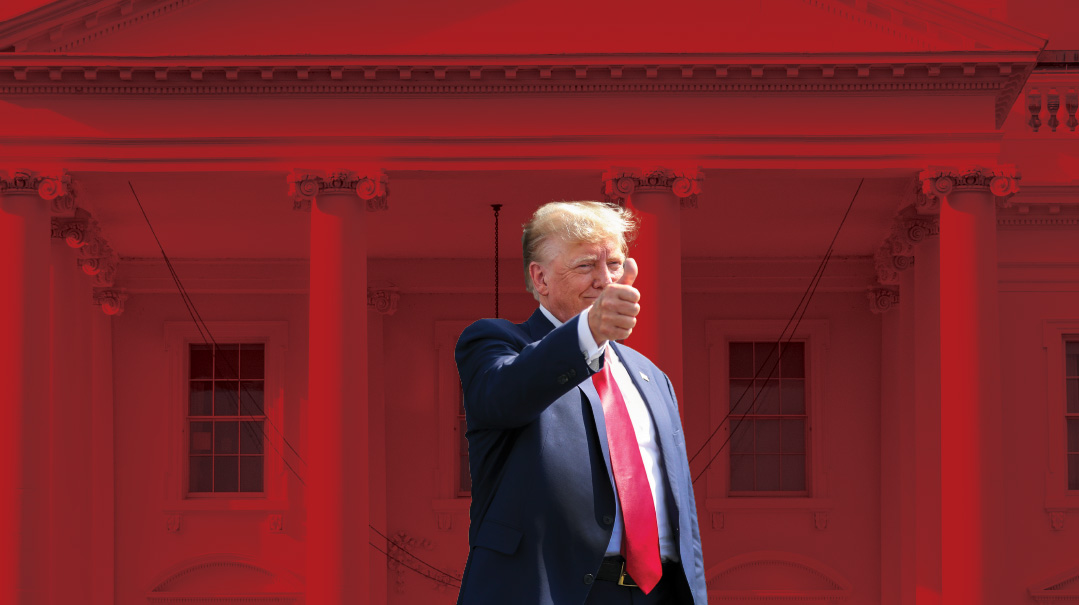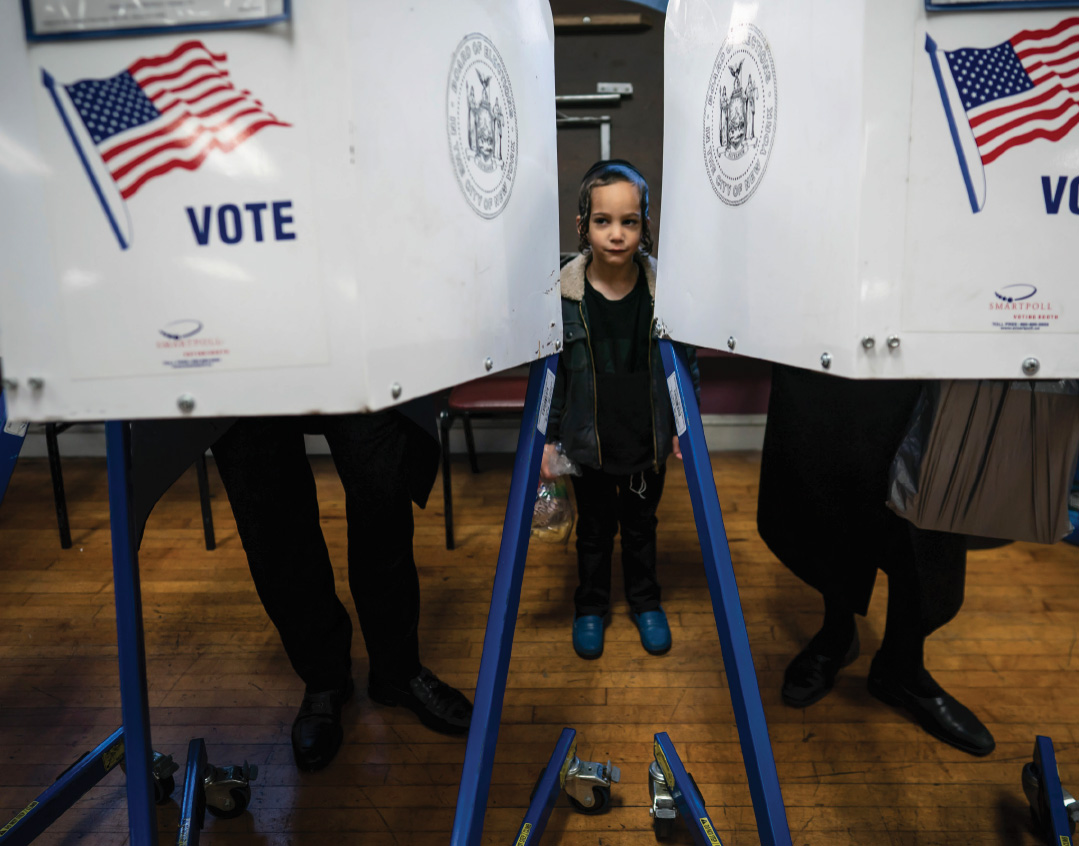Trump’s Triumphant Return

Trump’s victory validated the Republican Party’s risky decision to remake the party in his image

Photo: AP Images
Donald Trump is a survivor.
He survived two impeachment proceedings during his first term.
He survived two assassination attempts during the 2024 presidential campaign.
He survived constant character assassination, not to mention a handful of legal cases, most of which are still pending, that could have sent him to prison and prevented a return to the White House.
By defeating Vice President Kamala Harris in an election that wasn’t as close as the pollsters thought it would be, Trump becomes only the second president in US history to lose a battle to win a second consecutive term, only to end up being voted back in four years later. Grover Cleveland was the other, back in 1893.
Trump also prevailed in the face of a full-throated public relations campaign from pundits and left-leaning mainstream media outlets aimed at discrediting him and boosting Harris’s chances, even as it became obvious that she peaked in the polls as soon as her candidacy was announced. The final attempt was a faulty poll by a normally reliable pollster showing Harris ahead in Iowa by three points the weekend before Election Day, when he ended up winning the Hawkeye State by his biggest margin out of the three races in which he ran.
In retrospect, the only people the Harris hypesters fooled were themselves. They tried to convince voters that Donald Trump was a threat to democracy. They backed it up with exit polls showing that voters in key swing states said that was a key issue for them in their decision-making process — almost as important as the economy.
They harped on the fact that Donald Trump never won as much as 50% of the popular vote the two times he ran.
Guess what? Trump was standing at 51.2% of the popular vote as we went to print.
Trump’s victory validated the Republican Party’s risky decision to remake the party in his image. It also validated the decisions GOP primary voters made to stick with Trump at the polls despite a handful of reasonably attractive candidates who dared to challenge him.
Trump’s victory will also spark much handwringing and second-guessing among Democrats, who stuck with President Biden too long into the 2024 campaign, despite his frailties. They will also revisit their hasty decision to replace him with Harris, and her coronation based on joy, hope, and hype, which rang hollow.
Harris never distinguished herself during her four years as vice president, and failed to create any separation between herself and Joe Biden, whom a majority of Americans viewed as a failure. She sounded vacuous with her inability to articulate positions on vital issues such as the economy and illegal immigration.
In choosing Harris, Democrats severely overestimated the appeal of identity politics to voters, and seriously underestimated Trump’s growing appeal to blacks, Hispanics, Jews, and youth voters. Trump’s critics accused him of closing the campaign with a dark message of American decline, but enough American voters viewed it through a different lens, confident that Trump was representing a realistic view of America’s problems and a range of solutions, especially on pocketbook issues.
Derailing the Progressive Train
Part of the Democrats’ soul-searching will have to include pondering which direction to take, if they hope to win future electoral victories: Will they make a big shift to the center? Or will they feel compelled to move even more sharply to the left?
At press time, it appeared that the Republicans had recaptured control of the Senate, with some major upsets, including Bernie Moreno’s victory in Ohio over Democrat Sherrod Brown, who was denied a fourth term. Again, at press time, Republicans were on the verge of ousting another prominent Democratic incumbent, with Dave McCormick holding a 1.5% lead over Bob Casey.
Republicans also needed to flip only three more seats to cement control of the House of Representatives.
A Republican majority in both chambers will facilitate passage of Trump’s agenda and put a halt to Democrats’ progressive drift, which dominated Washington politics during eight years of the Obama administration and four years of Biden, interrupted only by Trump’s first term.
It won’t necessarily be smooth sailing along the shores of the Potomac. Trump will also be facing different challenges controlling a raucous party, even if Republicans capture both the Senate and the House.
While many of Trump’s handpicked candidates will be sworn into Congress in early January, a slim Republican majority in both chambers means it will not be an easy ride, as there are factions within the party that differ with some of Trump’s positions. When each vote is critical to pass legislation, individual lawmakers can drive harder bargains in return for their allegiance.
Changing of the Guard
Even after all the votes are counted and election results are certified, the Biden administration remains in power until the incoming president takes the oath of office at noon on January 20, 2025.
These 76 days between Election Day and Inauguration Day are formally known as the transition period. The outgoing Biden administration and the president-elect’s incoming team will meet regularly to ensure a smooth handover of power. Congress passed a law in 2022 mandating that transitions begin five days after the election, with teams from both candidates in cases where it’s unclear who won.
No matter how bitter the presidential campaign may have been, it’s traditional for the outgoing president to host the president-elect at the Oval Office a week after the election while the outgoing First Lady leads her successor on a tour of the White House.
According to the Center for Presidential Transitions, a nonpartisan group that’s written the playbook for the transition process, the Presidential Transition Act of 1963 calls on the outgoing administration to brief the president-elect on any national security threats the nation is facing and keep them in the loop on any ongoing major military or covert operations. This can include daily intelligence briefings. When President Obama handed over power to Donald Trump in 2017, transition teams simulated an emergency response scenario involving a hypothetical global pandemic that emerged in Asia and spread to the United States. This turned prophetic when the COVID-19 pandemic broke out two years later.
Even in a time of peace, health, and prosperity, a smooth transition is essential so that the federal government continues to function. Transition teams must conduct security clearances and ethics reviews of the estimated 4,000 political appointees, of which 1,200 require Senate confirmation.
Transition teams are also responsible for converting the party’s policy platform and campaign promises into a clear policy agenda, setting priorities and deadlines for the all-important first 100 days in office.
Israel Watches Closely
Israel will be eyeing the transition process carefully, for signs of who the incoming president will choose for key positions such as secretaries of State and Defense, and their roster of top foreign policy advisors.
The conventional wisdom is that Prime Minister Netanyahu was rooting for a Trump victory, but some Israeli-based foreign policy experts contended that Bibi has enough experience to deal with whatever hand the new administration deals, no matter who wins.
Asi Shariv, formerly Israel’s consul general in New York, noted on a conference call this week with the foreign press in Jerusalem that Trump enjoys an excellent relationship with Ron Dermer, Bibi’s right-hand man who serves in the Netanyahu cabinet as minister of strategic affairs. Shariv commented that although many assume Netanyahu would prefer a Republican victory, dealing with Trump would not be free of challenges.
“The things he said about the American administration during the last couple of years, he could never say about Trump because he knows there will be retaliation,” Shariv said.
Dr. Shira Efron, a fellow with Israel Policy Forum and a special advisor on Israel with the RAND Corporation, said that even some of Trump’s leading foreign policy advisors will force Israel to come to terms with important changes in relations between the two strategic allies, based on an updated doctrine of America’s geopolitical interests. Dr. Efron singled out Elbridge Colby, who served Trump in his first term as a deputy secretary of defense, who advocates that the US steer clear of foreign military involvements, except for China’s threat to Taiwan.
“[Colby’s view is]: “We don’t need high-maintenance friends. Israel is a realist, and Israel understands the US has priorities in other regions.”
No Prisoners
The election results will have a major bearing on whether Donald Trump can beat any or all of the various charges filed against him.
At press time, New York Supreme Court Judge Juan Merchan was scheduled to rule next Tuesday if the US Supreme Court’s 6-3 decision in July that former presidents can never be prosecuted for actions relating to the core powers of their office applies to Trump’s conviction in Merchan’s court of falsifying business records to hide a $130,000 hush money payment.
Even if he rules it doesn’t shield Trump, the Trump victory renders it highly unlikely that Merchan would carry through with a sentence that he was expected to hand down on November 26.
Trump faces charges in two other cases; in a federal court in Washington, D.C., and in a Georgia state court related to his alleged attempts to interfere with the 2020 election results.
Before the election, most legal experts said a Trump victory would effectively end those cases. Special Counsel Jack Smith, who brought the federal charges against Trump, better polish his resume as Trump promised to fire him as soon as he takes office. The state case in Georgia is rather moot now that Trump won Georgia this year.
The last charge, on which Trump is accused of mishandling classified documents after he left the White House, has already been dismissed by US District Court Judge Aileen Cannon, although the prosecution is appealing that ruling.
Cannon absorbed a great deal of criticism from the legal community for her controversial ruling, but now that Trump will be returning to the Oval Office, if he has any documents left in his personal possession, he can tuck them into his inside pocket, and bring them with him to his swearing-in.
(Originally featured in Mishpacha, Issue 1035)
Oops! We could not locate your form.







